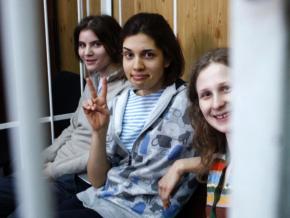Punks who protested Putin
Three members of the Russian punk band Pussy Riot were sentenced to two years in a prison colony on August 17. They were convicted of hooliganism and religious discrimination, but their real crime was to protest Russia's iron-fisted ruler President Vladimir Putin. Belfast Telegraph columnist wrote this article on the eve of the sentencing.
PUSSY RIOT have been accused of blasphemy, but may have saved the soul of music and even rediscovered revolution for Russia.
Feminist punks Maria Alyokhina, Yekaterina Samutsevich and Nadezhda Tolokonnikova will tomorrow show a defiant face to the might of church and state in Moscow, and in the process, reclaim the ethic that once made punk a force for freedom.
The trial of the three women arises from the wave of protests earlier this year against the dubious re-election of Vladimir Putin as Russian president.
Pussy Riot's distinctive intervention came on February 21 when they stepped onto the altar of the Orthodox Cathedral of Christ Savior, bowed, blessed themselves and offered a "punk prayer" in the form of a song begging the Virgin Mary to "drive Putin out" and denouncing Patriarch Kirill as someone who believed more in preferment under Putin than in the grace of God.
They have been charged with "premeditated hooliganism...motivated by religious hatred."
Pussy Riot have widely been presented as madcap activists out to provoke, which is true enough, but far from the full story. Maria (24) is a student and a member of Greenpeace, with a young son. Yekaterina (30) is a computer programmer and gay rights campaigner. Nadezhda (22) is a student at Moscow University, married with a four-year-old daughter.

It is not certain these are the three who pranced across the altar. There's around a dozen women in Pussy Riot. They wear balaclavas and give interviews under interchangeable interesting nicknames--"Seraphim," "The Cat," "Terminator," "Blondie," "Dagwood," "Schumacher," etc.
The band was involved last year in painting a huge male organ on a drawbridge across the Neva in St. Petersburg so that when the bridge was lifted, the nearby offices of the political police saw a five-meter member majestically rise.
PUTIN AND the Patriarch recognize Pussy Riot as a serious threat. It is not just that their chutzpah appeals to millions of the restless among Russia's youth, but that they draw on a deep tradition of political struggle which once gave a glimpse of how the world might be, but which was buried by Stalinism and now is suppressed by its free-market variant under Putin.
Nadezdha wears a T-shirt with the slogan of the left in the Spanish Civil War: "No Pasaran." The slogan was used more recently by Unite Against Fascism in demonstrations against the English Defense League.
In her closing statement, she spoke of "Stalin's Great Terror"; characterized Russia today as "dominated by rigidity, closedness and caste...serv[ing] only narrow corporate interests"; and referenced the Oberiu poets of the 1920s and 30s who defended imagination against deadening orthodoxy and were purged, imprisoned and put into psychiatric wards. She ended by predicting "the collapse of this political system."
Pussy Riot's choice of the Cathedral for their anti-Putin performance was apt. "The Orthodox religion had the aura of a lost history, of something crushed and damaged by the Soviet totalitarian regime," explained Yekaterina.
Faced with sinking popularity, Putin's regime appropriated this legacy in order to "present their new political project as a means of restoring Russia's lost spiritual values," she said in a closing statement. For its part, the Church "took on the role of "confront[ing] all baleful manifestations of contemporary mass culture, with its concept of diversity and tolerance."
Patriarch Kirill, a former KGB colleague of Putin's, was appointed Primate of All Russia in February 2009. "After this happened," says Yekaterina, Christ the Savior Cathedral "began to be used openly as a flashy setting for the politics of the security services--the main source of power." Putin and Kirill regularly appeared together at televised events in the Cathedral, "providing background shots for morally and ethically edifying news stories."
Using the same altar to urge the Virgin Mary to "drive Putin out" was not blasphemy, but a cry of protest against the blasphemers, political as well as religious.
The Russian Revolution of 1917 was marked by an unprecedented efflorescence of creativity and daring in art, literature, music, architecture and much else. The moment didn't last. But it provided the glimpse of a golden future which Pussy Riot still hold within them.
Pussy Riot erupted into global consciousness in the wake of musical travesties closer to home--Madness loyally performing on the roof of Buckingham Palace before confirming their inoffensiveness at the Olympics; The Who bringing the closing ceremony to a conclusion, and making many fans weep that they hadn't died before they got old; The Sex Pistols' "God Save the Queen" mushily incorporated into the mainstream.
Enough to make any true lover of rock and roll retch. Where have all the punk radicals gone? Gone to sponsorship (almost) every one. Only Ani DiFranco comes to mind as a righteous babe to stand alongside Maria, Nadezhda and Yekaterina.
In this moment, Pussy Riot are the most important band in the world.
First published in the Belfast Telegraph.


